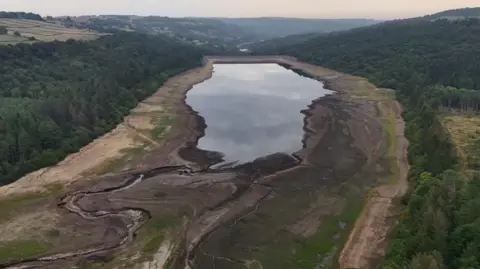**Heatwave Hits England: Temperatures Surge to 33C**
As England steps into its fourth heatwave of the summer, temperatures are soaring past 30°C in various regions, with Tuesday’s high reaching 33.4°C in Northolt, located in west London. While numerous areas in the South West, Midlands, North West, and East Anglia have officially met the criteria for a heatwave—defined as three consecutive days of high temperatures—the capital and South East have not yet experienced the same conditions.
The escalating temperatures come on the heels of a prolonged dry spell, which has now led to what experts are calling a “nationally significant” water shortfall. This alarming situation has been highlighted by the National Drought Group involving the Met Office, regulators, governmental bodies, and water companies, indicating that the lack of rain and extreme weather are creating adverse environmental impacts.
Many environmental challenges are manifesting due to this water shortage, with detrimental effects on agriculture, wildlife, and an increase in wildfires reported across the country. On the same note, areas in Wales, Scotland, and Northern Ireland are also experiencing heightened temperatures, with Cardiff recording 32.8°C, Charterhall at 29.4°C, and Armagh at 27.8°C. Wednesday is set to follow suit, with predictions that these regions could surpass the required temperature threshold for heatwave status.
**Impacts on Public Health and Infrastructure**
The UK Health Security Agency has issued amber alerts for regions across the Midlands, East Anglia, London, and the Southeast, warning residents about potential health risks associated with the heat. Measures to mitigate the impacts of extreme weather have been put in place, but authorities remain alert to the higher vulnerability of specific groups, including older adults, young children, and those with underlying health conditions. Dr. Paul Coleman, a consultant in public health at the UKHSA, noted a notable increase in public awareness regarding the dangers of excessive heat.
As the heat has intensified, it has also plagued rail services. With cancellations and speed restrictions placed on Greater Anglia and South Western Railway services, the infrastructure challenges have exacerbated due to the shrinking soil under the tracks, known as soil moisture deficit, causing railway tracks to become uneven.
**Drought and Water Crisis**
In the wake of the ongoing heatwave, hosepipe bans have been enacted across millions in England, reflecting the urgent need to limit water usage amid deteriorating water supplies. The drought has deep roots; it commenced earlier in the summer following an unusually dry spell, marking the sixth driest spring on record since 1836. Criticism has been directed toward water companies for their management of infrastructure, where numerous leaks have occurred. The GMB union notably condemned the hosepipe ban implemented by Thames Water, pointing out that the company has lost an astounding 200 billion liters of water over the last year.
Farmers are particularly feeling the strain, as the adverse weather conditions have negatively influenced crop yields, particularly for staple produce such as wheat and barley. Renowned farmer and television personality Jeremy Clarkson expressed concern over this year’s harvest, suggesting it could lead to significant food shortages. Fellow farmers echo these thoughts, with the vice-president of the National Farmers Union, Rachel Hallo, emphasizing the importance of water as a strategic resource essential for food production.
**Climate Change and Future Concerns**
While drawing direct correlations between climate change and individual extreme weather events can be challenging, climate scientists assert that these conditions are becoming more severe and frequent due to global warming. Sir David King, former chief scientific advisor to the government, underscored the urgency of this crisis, stating that it demands a fundamental re-evaluation of how water resources are valued and used.
The increasing prevalence of heatwaves reflects broader climate shifts. In 2025 alone, the UK has already recorded 13 days of temperatures exceeding 30°C. Despite being lower than the counts in previous years, it demonstrates a worrying trend. Projections indicate that temperatures could drop slightly in the short term, with possible thunderstorms expected, but the forecast remains uncertain: conditions may warm up once more as the weekend approaches.
In summary, while England grapples with the immediate challenges posed by its latest heatwave, the implications of climate change and water scarcity underscore a need for genuine discussions about environmental conservation and sustainable resource management. The citizens, authorities, and organizations must work hand in hand to combat the pressing issues created by extreme heat and water shortages in a warmer world.











